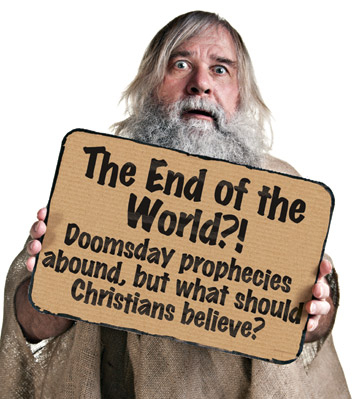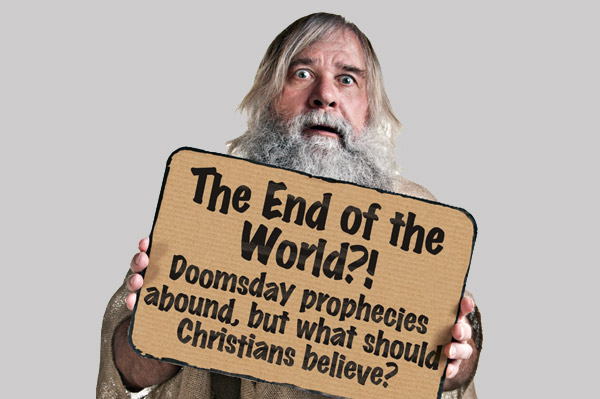 The American humorist Mark Twain, after hearing that his obituary had been published in a New York newspaper, commented, “The reports of my death are greatly exaggerated.” In recent months one might paraphrase Twain's remark to observe, “The reports of the end of the world are greatly exaggerated.” After the much-publicized prediction by California preacher Harold Camping that the world would end at about 6 p.m. on May 21, 2011, passed quietly, many heaped scorn upon Camping and his followers. According to Camping, on that date the righteous were to be “raptured” from the world, spared the agonies of the subsequent “tribulation” and delivered into eternal bliss. When the spectacular event did not happen, Camping quickly adjusted his timetable to predict the rapture on October 21, 2011. Reportedly, Camping claimed that he had misunderstood the significance of the May 21 event; it was not the date of the rapture but rather the deadline for repentance and admission to the company of those who would be spared the sufferings of the tribulation.
The American humorist Mark Twain, after hearing that his obituary had been published in a New York newspaper, commented, “The reports of my death are greatly exaggerated.” In recent months one might paraphrase Twain's remark to observe, “The reports of the end of the world are greatly exaggerated.” After the much-publicized prediction by California preacher Harold Camping that the world would end at about 6 p.m. on May 21, 2011, passed quietly, many heaped scorn upon Camping and his followers. According to Camping, on that date the righteous were to be “raptured” from the world, spared the agonies of the subsequent “tribulation” and delivered into eternal bliss. When the spectacular event did not happen, Camping quickly adjusted his timetable to predict the rapture on October 21, 2011. Reportedly, Camping claimed that he had misunderstood the significance of the May 21 event; it was not the date of the rapture but rather the deadline for repentance and admission to the company of those who would be spared the sufferings of the tribulation.
Apocalypse Now?
This latest failed prediction of the return of Jesus and the end of the world as we know it has led to several responses. There are those outside the Church who ridicule Camping and his followers as part of a lunatic fringe, worthy only of scorn and contempt. Media reports often convey this thinly veiled disdain. Comedians derive considerable grist for their joke mill at the expense of those who make and believe such predictions. Frequently, the scope of the derision is broadened to include Christianity and Christians generally. It is concluded that these failed predictions expose Christian faith as the wishful thinking of gullible people who lack the ability to see through the delusions of religious belief.
Within the Church, many distance themselves entirely from the kind of speculation promoted by Camping and others of his ilk. Some reject belief in the return of Jesus and the accompanying judgment altogether, asserting that a God of love would never subject humans to such consequences. Others simply conclude that the kind of precise predictions made by Camping are doomed to failure since it is not possible to know the time or season of Jesus' return. Finally, there are those who continue to follow Camping faithfully, accepting the explanation that his calculations were mistaken and that a revised computation will produce a more reliable prediction.
These various responses raise serious questions for Christians. How are we to respond to repeated predictions of the return of Jesus that prove untrue? How do we assess their credibility? What do we say when scorn is heaped upon the gospel because of these failed predictions? Is Christian faith ultimately discredited?
Thy Kingdom Come
In response to these questions, it may be helpful, first of all, to put predictions of the return of Jesus into a larger historical perspective. The anticipation of Jesus returning to earth to complete the work of God is a longstanding feature of Christian faith and is rooted in Scripture. In light of the teaching of Jesus, his stunning death and his dramatic Resurrection, his followers were convinced that God would act to establish the Kingdom of God in its fullness. Many in the Early Church were convinced that Jesus' departure from earth into Heaven after his Resurrection would be short-lived and that his return was imminent. Jesus' encouragement to his followers to pray, “Your Kingdom come” (Matthew 6:10) in the Lord's Prayer is consistent with this expectation. So, too, was the Thessalonians' belief in the impending return of Jesus. In his letters to the church at Thessalonica, Paul addressed Jesus' return and indicated that it formed part of his early Christian preaching. Elsewhere, the prayer with which Paul closed his first letter to the Corinthians, “Maranatha—our Lord, come” (see 1 Corinthians 16:22), expresses this hope. So, too, does Revelation 22:20 which concludes with the plea, “Come, Lord Jesus!” The fact that Jesus did not return quickly after his Ascension caused some consternation within the Early Church, but it has not caused the Church to abandon this hope.
It is also important to recognize that attempts to predict the precise date of Jesus' return have been made throughout Christian history. In the second century, a group known as the Montanists eagerly anticipated the return of Jesus and the end of the world. In the Middle Ages, Joachim of Fiore developed an elaborate timetable for the second coming. Closer to our time, especially since the establishment of the state of Israel in 1948, speculation has run rampant. For example, in the 1970s, Hal Lindsey's book, The Late, Great Planet Earth, spawned increased speculation about the world's end. In the mid-1990s, a series of Left Behind books by Tim LaHaye and Jerry Jenkins, subsequent movies and even video games dramatized the rapture and the tribulations of those who were to be left behind. Almost on a daily basis, Christian preachers speculate about the end of the world. There is, therefore, a long tradition of end-of-the-world predictions within Christianity.
But while such predictions are grounded in the important affirmation that God will bring his Kingdom to completion and that the return of Jesus will be key to this, the most prominent characteristic that these doomsday predictions have in common is that they have all been wrong: Jesus has not yet returned, the righteous have not been raptured and the world continues on. Where have these predictions gone wrong? I offer four suggestions.
1. Calculations about the end of the world run counter to Jesus' own warnings that the coming of the Son of Man will occur unexpectedly (see Matthew 24:36-44 and Mark 13:32-37). Jesus' assertion that “about that day or hour no one knows … but only the Father” is ignored or explained away on the assumption that the real timetable has been revealed to us in Scripture. All we have to do is to uncover what is hidden in Scripture and make the right connections with events in our time. Experience has shown, however, that these connections are entirely subjective and open to adjustment when the predicted events do not occur.
2. Scripture can be twisted to say almost anything. For the most part, these apocalyptic readings of the Bible pick and choose texts willy nilly from selected biblical books (such as Daniel, Matthew 24, 1 and 2 Thessalonians and Revelation) and weave them together to create a highly speculative and subjective timetable of events. Passages are often lifted out of their literary and historical contexts and forced to fit with current events. There is no constraint upon the interpreter's imagination. The Bible is treated as little more than a set of tarot cards or a Ouija board.
3. The richness of the gospel is narrowed to a fascination with the end of the world. The central Christian messages of the love of God for the world, of the life, death and Resurrection of Jesus, of the salvation that is provided through Jesus Christ, and of our vocation to serve the purposes of God in the world are pushed to the side in favour of speculation about the timing of Jesus' return. We are left with a truncated gospel that is really good news only for a select few.
4. Speculation leads to the division of the world into the righteous and the damned, with little hope for the latter. Doomsday predictions tend to convey the message that the world is beyond redemption, that God has given up on the world and that all that remains is its judgment and destruction. Such views can lead Christians to cocoon themselves in enclaves of the redeemed and to abandon any efforts to improve the world by alleviating suffering or seeking justice. If God is about to bring the world to an end, why would we be at all interested in it?
Future Oriented
Having said all of this, it is not sufficient simply to dismiss people such as Camping as part of a fanatical and misguided fringe in the spectrum of Christianity. Behind the failed predictions, abuse of Scripture and judgmental attitudes, there is a kernel of truth in what they teach. This is what makes coming to grips with predictions of the end of the world so challenging for Christians.
Our biblical faith is future-oriented in the sense that God's work in the world is in progress and awaiting its completion. God is not yet finished with us; his Kingdom has not yet come in its fullness. This affirmation is the consistent testimony of Jesus in the Gospels, it undergirds Paul's theology and it dominates Revelation. Our Christian hope is based upon it. In a world that is focused on the immediate moment and has little sense of history or of a future, people like Camping remind us of the Christian orientation toward the future.
Nevertheless, we must not narrow Christian hope to a particular scheme of events or a specific timetable. The good news of Jesus Christ gives us hope for the future that is richer than what is found in end-of-the-world predictions.
Click here to read part two, which examines the scope of our shared Christian hope.
Dr. Donald Burke is president and professor of biblical studies at The Salvation Army's Booth University College in Winnipeg.










Hello Dr. Donald Burke, I just read your article titled: The end of the world as we know it.
You are correct, too many predict the timeline for the Rapture and not one has got it right. Yet the bible predicts the coming of Elijah the prophet before the Day of The Lord. As you know the Day of the Lord is known also as the Day of God's Wrath or the Wrath of God.
The Wrath of God has a beginning and an ending.
If we can discover when God's Wrath commences we will learn when God's endtime prophet Elijah will make his appearance.
Revelation 11:18 is the exact halfway point in the seven year Tribulation and look at what event is taking place.
REVELATION 11:18 "The world was angry and your wrath has come"
It is written that Elijah will restore all things, meaning he will correct all false doctrines and will bring families back together.
I believe Elijah will tell us when the Rapture will take place. Bruce